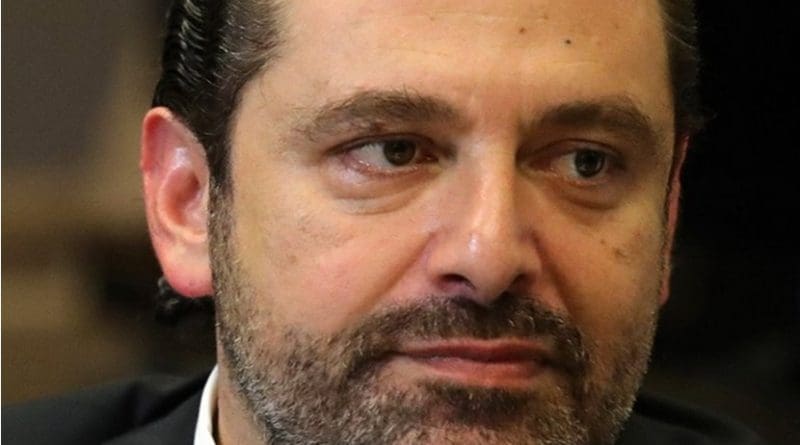A Hariri-Led Government May Be Lebanon’s Last Chance – OpEd
By Arab News
By Osama Al-Sharif
Lebanon’s political impasse, triggered by the Aug. 4 Beirut port explosion that forced Prime Minister Hassan Diab to resign, is not ending soon, despite the fact France has kept its initiative on the table. President Emmanuel Macron has denounced the ruling political class in Lebanon for derailing the efforts of Prime Minister-designate Mustafa Adib to form a nonpartisan Cabinet of experts to salvage an economy in freefall, which has left more than half of the country’s population in abject poverty. But he also knows that the same ruling elite could approve a deal to name and support a new prime minister.
Lebanon’s last chance of recovering from its deep economic crisis is the French initiative, which promises to deliver badly needed international aid. Standing in the way is the so-called Shiite duo: Hezbollah and the Amal Movement. They have insisted on taking the finance portfolio, setting a dangerous precedent for a country that is reeling from sectarian divisions and rivalries. A majority of Lebanese, who took to the streets last year and brought down the beleaguered government of Saad Hariri, want a new political deal that shuns the sectarian power-sharing agreement that was reached in Taif in 1989.
Now Hariri is proposing himself as the only candidate that can break the stalemate. He certainly has the backing of Paris and is seen as a tested figure both locally and regionally. But the conditions for his success remain the same: He must be allowed to form an independent government that has the mandate to implement tough reforms that would repair Lebanon’s fractured image and restore the confidence of foreign donors, as well as the Lebanese public. The coming few days will determine if this is Lebanon’s last chance of ending the current spiral and saving the French initiative.
Meanwhile, there is another twist in the conflicted Lebanese scene. US Secretary of State Mike Pompeo this month announced that Lebanon had agreed to negotiate a maritime border demarcation deal with Israel, under the UN’s auspices. Surprisingly, Hezbollah, which portrays itself as a staunch enemy of Israel, has not objected to these bilateral talks, which are due to start on Wednesday. Lebanon claims that Israel has encroached on an 800 square km area of its waters. These waters are believed to be rich in natural gas, which would provide an economic lifeline for struggling Lebanon.
Questions remain over who exactly will negotiate with the Israelis and whether the talks will extend to the disputed land borders along the 1949 armistice lines, which include what Hezbollah considers to be Israeli-occupied Lebanese territory. The timing of this is intriguing as it comes as the Trump administration is pushing to add more Arab nations to the growing number that are normalizing ties with Israel.
But the US’ interests in Lebanon go beyond the issue of resolving maritime border disputes. Washington sees Lebanon as part of its program to isolate Iran and its regional proxies. It has listed Hezbollah as a terrorist organization, as have a number of European countries, and it will put pressure on any new government to distance itself from the Tehran-backed militia.
Hezbollah, on the other hand, understands that it is being targeted at a crucial geopolitical moment. Iran is in no position to extend further financial help to its Lebanese proxy. Hezbollah’s role in smuggling fuel and other goods to Syria, at the expense of the suffering Lebanese, has hurt its image inside Lebanon and among the Shiites. Its alliance with President Michel Aoun, who has become increasingly unpopular, is becoming a liability for both. The group’s leader, Hassan Nasrallah, may be regretting the fact that his party has gotten entangled in Lebanese politics. Macron has called on him to decide whether Hezbollah is a political party or an armed militia.
Certainly the biggest issue for Washington, as well as for Israel, is the fate of Hezbollah’s arms. The party has become a state within a state and its agenda — an extension of that of Iran — has become a major destabilizing factor for Lebanon.
While Lebanon will not normalize ties with Israel anytime soon, the maritime border talks will contain the tensions along their common borders. Hezbollah’s acquiescence reflects its deep internal crisis. It has to either back Hariri’s candidacy or face dire consequences, both domestically and beyond. The alternative will mean chaos and may push Lebanon closer to a civil war.
With talks between Israel and Lebanon imminent, it will be interesting to see whether Washington will be able to exert enough pressure on both sides in order to reach a historic agreement. Meanwhile, if Hariri is successful in forming an independent government, a window of hope will open for Lebanon to extract itself from economic and social ruin. But the road toward a new political deal for Lebanon is littered with obstacles as the country attempts to free itself from the clutches of Iranian interference.
- Osama Al-Sharif is a journalist and political commentator based in Amman. Twitter: @plato010

